|
|
|
Sort Order |
|
|
|
Items / Page
|
|
|
|
|
|
|
| Srl | Item |
| 1 |
ID:
151429
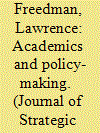

|
|
|
|
|
| Summary/Abstract |
The question of the appropriate relationship between academics and policy-makers is not new and is unlikely ever to be answered to everyone’s satisfaction. There is no rule which says that academic research must be motivated by anything other than innocent curiosity or the state of the discipline, or that policy-makers are under any obligation to take any notice of academic advice given the other demands on their time. Nor is it the case that the academic influence is invariably benign.
|
|
|
|
|
|
|
|
|
|
|
|
|
|
|
|
| 2 |
ID:
166148
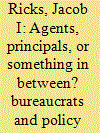

|
|
|
|
|
| Summary/Abstract |
In the aftermath of the 2006 and 2014 Thai coups, observers declared the resurrection of the bureaucratic polity. Bureaucrats, though, remained influential even during the period of 1992–2006, when elected politicians were thought to command the Thai state. Bureaucratic involvement in politics poses a challenge for dominant political science theories of politician–bureaucrat relationships, which draw heavily from principal–agent frameworks. I apply agency theory to Thailand, testing three different hypotheses derived from the theory. Examining legislative productivity and control over bureaucratic career trajectories, I find that elected politicians increasingly acted as principals of the Thai state from 1992 through 2006, and to a lesser degree from 2008 to 2013. Thai bureaucrats, though, have frequently engaged in the political sphere, blunting political oversight and expanding their independence vis-à-vis politicians. This suggests that the principal–agent model overlooks the range of resources that bureaucracies can bring to bear in developing countries, granting them greater autonomy than anticipated. As such, theories of the politician–bureaucrat relationship in developing states need to better account for the mechanisms through which bureaucrats exercise policy discretion and political influence.
|
|
|
|
|
|
|
|
|
|
|
|
|
|
|
|
| 3 |
ID:
086994
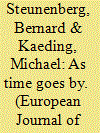

|
|
|
|
|
| Publication |
2009.
|
| Summary/Abstract |
The aim of this article is to explain the speed with which Member States transpose EC directives in the maritime sector. By discussing earlier work, the focus is on explanatory factors related to the contents of the directive that needs to be transposed and the context within which national transposition takes place. The authors' expectations have been tested using data across seven Member States and 32 maritime directives. Using survival analysis based on Cox regression, several political-administrative and legal factors are identified that have an impact on the speed of transposition. The political sensitivity of the directive and the total number of national implementing measures lengthens the duration of transposition, while the degree of specialisation of the directive, the use of package law and experience speed up transposition. The authors also find that the impact of some of these explanatory factors changes over time. This underscores the importance of taking time seriously and to explore time dependency in further theoretical work on explaining policy-making processes.
|
|
|
|
|
|
|
|
|
|
|
|
|
|
|
|
| 4 |
ID:
084493


|
|
|
|
|
| Publication |
2008.
|
| Summary/Abstract |
Healthy eating is high on the government's agenda in current times and to all intents and purposes the media appears to have played a crucial role in putting it there. While media focus is no doubt intense and playing a vital role in public education (take Jamie Oliver's 2005 Channel 4 documentary, 'School dinners', for example), the question that lies at the heart of this article, is whether the media has led the government agenda on healthy eating and school dinners as appears to be the case. A close examination of the evidence suggests otherwise: government policy was already well set before the media began to show a concerted interest and hence its influence on policy-making is more limited than might be expected. Rather than setting agendas per se, the media's role has been to refine and energise existing policy areas and to facilitate implementation.
|
|
|
|
|
|
|
|
|
|
|
|
|
|
|
|
| 5 |
ID:
155416
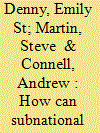

|
|
|
|
|
| Summary/Abstract |
This article explores how a devolved government in a small country, faced with external constraints beyond its immediate control, can deploy policy resources to shape a distinctive approach to public services. We analyse recent homelessness policy in Wales using the NATO (Nodality, Authority, Treasure, Organisation) typology of tools of government proposed by Hood and Margetts, and show how this can be applied usefully to understand the choices that governments must make in conducting relationships with other institutions. We conclude that a combination of Nodality and Authority provide powerful resources for a subnational government which has only limited formal powers and fiscal autonomy.
|
|
|
|
|
|
|
|
|
|
|
|
|
|
|
|
| 6 |
ID:
075646
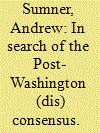

|
|
|
|
|
| Publication |
2006.
|
| Summary/Abstract |
The policy-making context in the 'South' would seem to have changed in recent years, potentially opening space for alternative voices. The international financial institutions no longer overtly insist on policy content. The 'locally owned' Poverty Reduction Strategy Paper (prsp) has become the main vehicle for policy. Many have argued prsps represent a 'remorphing' of neoliberalism or the Washington Consensus as practised by the international financial institutions for much of the 1980s and 1990s. However, although much research on prsps has focused on the process of prsp production and the extent of participation, the outcome of the prsp process-the actual prsp-and its content has received relatively limited attention. This article is an exploratory piece. Taking the content of 50 prsps the following question is posed: has the prsp process opened space for something new, Stiglitz's post-Washington Consensus, or for the reproduction of the former Washington Consensus?
|
|
|
|
|
|
|
|
|
|
|
|
|
|
|
|
| 7 |
ID:
155819
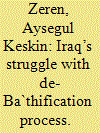

|
|
|
|
|
| Summary/Abstract |
Vetting/lustration/purging is one of many transitional justice mechanisms, designed for addressing the atrocities of a former regime, restoring peace, providing justice and engendering unity and reconciliation. It specifically aims to purify the public sphere of former regime members or of people who lack integrity. de-Ba`thification of Iraq is one of the latest transitional justice mechanism that can be examined under this category. The process of de-Ba`thification holds lessons and provides valuable insight into policy-making well beyond the Iraqi context. This article presents a detailed analysis of the implementation of de-Ba`thification process in Iraq and a number of lessons to be learned/relearned by policy-makers. Data gathering involves in-depth and formal interviews with the designers and implementers of de-Ba`thification project including Coalition Provisional Authority (CPA) administrator and advisors; Higher National de-Ba`thification Commission (HNDBC) and Accountability and Justice Commission (AJC) members; other US and Iraqi officials.
|
|
|
|
|
|
|
|
|
|
|
|
|
|
|
|
| 8 |
ID:
083215
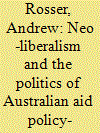

|
|
|
| 9 |
ID:
166116
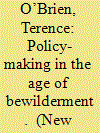

|
|
|
|
|
| Summary/Abstract |
Terence O’Brien considers geopolitics and New Zealand’s relationships and suggests the need for an alternative and progressive trade strategy.
|
|
|
|
|
|
|
|
|
|
|
|
|
|
|
|
| 10 |
ID:
168523


|
|
|
|
|
| Summary/Abstract |
Lobbying is a potential source of corruption but is also a valuable source of information for policy-makers. We analyze a game-theoretic model that shows how the threat of corruption affects the incentives of noncorrupt politicians to enlist the help of lobbyists to make more informed decisions. Politicians face a dilemma because voters cannot always tell whether a politician allows access to lobbyists to solicit corruption or to seek information. Thus, a noncorrupt politician may deny access to lobbyists to signal that she is noncorrupt even though doing so impedes her ability to make good policy. This signaling may decrease the welfare of the voters depending on the value of the lost policy information relative to the value of screening out corrupt politicians.
|
|
|
|
|
|
|
|
|
|
|
|
|
|
|
|
| 11 |
ID:
140217
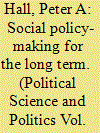

|
|
|
|
|
| Summary/Abstract |
Dismantling the Welfare State is a classic work, as fresh and stimulating today as when it was fi rst written. Many of the insights in it are central to the study of policy making today. One is the core thesis, stated on the opening page, that “retrenchment is a distinctive and difficult political enterprise…in no sense a simple mirror image of welfare state expansion.” Paul Pierson was the fi rst scholar to show that theories about how welfare states were built are inadequate for understanding the politics of how they were sustained or reformed in the context of lower growth rates during the 1980s and 1990s. For that purpose, we need a new analysis of the “politics of retrenchment” that the book provides.
|
|
|
|
|
|
|
|
|
|
|
|
|
|
|
|
| 12 |
ID:
158458


|
|
|
|
|
| Summary/Abstract |
Syria's devastating war unfolds during unprecedented flows of imagery on social media, testing in new ways the media's influence on decision-makers. Three decades ago, the concept of a “CNN Effect” was coined to explain what was seen as the power of real-time television reporting to drive responses to humanitarian crises. This essay explores the role traditional and new media played in U.S. policy-making during Syria's crisis, including two major poison gas attacks. President Obama stepped back from the targeted air strikes later launched by President Trump after grisly images emerged on social media. But Trump's limited action did not shift policy. Interviews with Obama's senior advisors underline that the media do not drive strategy, but they play a significant role. During the Syrian crisis, the media formed part of what officials describe as constant pressure from many actors to respond, which they say led to policy failures. Syria's conflict is a cautionary tale.
|
|
|
|
|
|
|
|
|
|
|
|
|
|
|
|
|
|
|
|
|